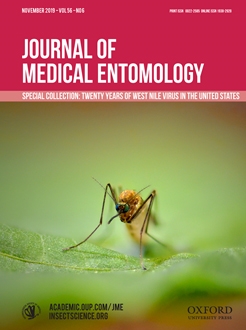The summer of 2018 was very hot and dry with little rain nationwide in Japan. Particularly in July, temperature was 3°C higher in comparison with the normal year. We collected adults, pupae, third or fourth instar larvae of Aedes albopictus (Skuse) in Sendai city, Niigata city, and Kanazawa city in late July and early August 2018. Wild-collected adults were examined for reproductive capacity. On the other hand, wild-collected larvae and pupae were raised to adults in the laboratory and then examined for reproductive capacity. They did not lay eggs after single blood feeding. When they were supplied with bloodmeals twice or three times, they laid a small number of eggs, but these eggs did not hatch. When these adult individuals were maintained at 25°C for 3 wk and then fed with blood, they laid healthy eggs which developed to embryos. It is thought that extreme heat and/or extreme low humidity due to low precipitation reduced female reproductive capacity even if they could take bloodmeals.
How to translate text using browser tools
20 June 2019
Reduction of Reproductive Capacity in Aedes albopictus (Diptera: Culicidae) in Hot, Dry Summer
Md. Shah Alam,
Nobuko Tuno
ACCESS THE FULL ARTICLE
It is not available for individual sale.
This article is only available to subscribers.
It is not available for individual sale.
It is not available for individual sale.

Journal of Medical Entomology
Vol. 56 • No. 6
September 2019
Vol. 56 • No. 6
September 2019
global warming
high temperature
POPULATION GROWTH
Precipitation





